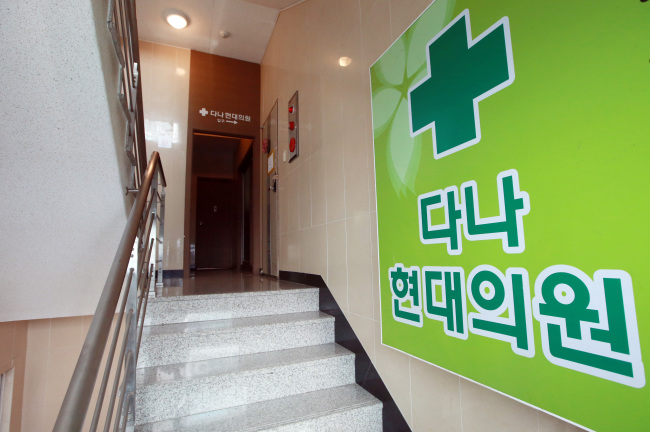A total of 71 South Koreans are confirmed to have been infected with hepatitis C caused by reused syringes at a clinic in Seoul as of Friday, health authorities said.
The Health Ministry said on Friday a medical doctor of Dana Hyeondae Clinic in Seoul’s Yangcheon-gu claimed he suffered from brain injuries since 2012 while admitting to having resused disposable needles during blood donations that resulted in the massive hepatitis C infection.
The Health Ministry is testing 2,268 more patients who have been treated at the clinic. The clinic has been shut down, and the doctor has been reported to the police by the health authorities.
 |
| Dana Hyeondae Clinic, where 67 patients have been confirmed to have have been infected with hepatitis C after receiving intravenous injections. Yonhap |
For all of the 71 confirmed cases, the ministry has concluded after its investigation that the patients contracted the virus from repeated use of the disposable syringes used for transfusions. All of the 71 patients received intravenous injections, mostly vitamin C or vitamin B1 transfusions for physical fatigue.
The 52-year-old doctor, whose name was withheld, told authorities that he reused syringes partly because of his essential tremor, a condition which involves a tremor of hands and fingers, saying it made it difficult for him to unwrap new ones. The doctor claimed that he suffered a brain injury from a car accident that resulted in minor speech disorder, impaired mobility and essential tremor.
His wife is currently being investigated by the police on charges of illegally treating patients without a medical license on behalf of her husband.
“The doctor is claiming that he had never reused old syringes prior to his injury in 2012, but we’ve heard from another source that this may not be true,” the Health Ministry said in a statement. “We’ve heard that the doctor used disposable syringes on a number of patients even before 2012.”
According to the Health Insurance Review and Assessment Service data, 98 percent of the patients who visited Dana Hyeondae Clinic received intravenous injections. The rate is dramatically higher than the average proportion of patients who receive the treatment nationwide at all clinics, which is 19.29 percent.
Hepatitis C is an infectious disease affecting mostly the liver, caused by the hepatitis C virus. The infection is often asymptomatic, but chronic infection can lead to scarring of the liver and ultimately to cirrhosis. The virus is known to spread primarily by blood-to-blood contact via intravenous drug injections or poorly sterilized medical equipment.
Health authorities said all patients who received intravenous injections will be also tested for other bloodborne infectious diseases, including HIV, hepatitis B, malaria and syphilis.
Those who have visited the clinic and wish to be tested for hepatitis C can call (02) 2620-4920~9.
By Claire Lee (dyc@heraldcorp.com)

